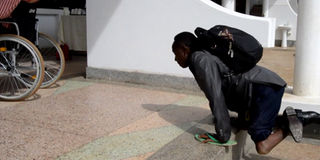Prime
PWDs have not benefited from Emyooga programme – survey

One of the persons with disabilities tries to climb a stair at Maria-Flo hotel in Masaka city on October 1, 2022. PHOTO | ISSA ALIGA
What you need to know:
- Launched in July 2020, the Emyooga programme where the government has so far injected a whooping Shs260b targets low-income Ugandans in the informal sector to enable them to boost their household incomes and grow their small-scale businesses
The majority of persons with disabilities (PWDs) in the Masaka sub-region have not benefited from the Emyooga programme due to accessibility challenges.
According to the 2021 survey done by the Foundation for Education and Empowerment of Young Disabled Persons of Uganda (FEEYDIP), a big number of persons with physical disabilities like the blind, deaf and those with intellectual and mental disorders were left out of the Emyooga programme.
Launched in July 2020, the Emyooga programme where the government has so far injected a whooping Shs260b targets low-income Ugandans in the informal sector to enable them to boost their household incomes and grow their small-scale businesses.
However, in some districts, the targeted beneficiaries have received the money and used it for gratification while others have received half of the money after the implementers of the programme at the district levels swindled a portion of it.
Mr Oscar Walukhu Wakooli, the secretary FEEYDIP, said the Microfinance Support Centre was tasked by the government to oversee the Emyooga programme and mobilized people to form Savings and Credit Cooperative Organisations (SACCOs) and train them on financial literacy skills, but only 633 out of 8206 the PWDs in the region have benefited.
He said they have found out that government offices running the Emyooga programme are also not accessible by many PWDs.
''Emyooga offices in the region and other parts of the country are located in places with staircases where there are no access ramps and thus some PWDs cannot have access to these offices,” he said, adding that still, the officers spearheading the programme do not have skills of sign languages to interpret the information to the blind and deaf persons.
''Some government workers who lack the required skills and knowledge in brails and sign language, have limited their engagements with persons with different disabilities,'' he noted.
He added that information about the Emyooga programme is also not in 'accessible formats' like brails. ''If the deaf and the blind are interested in this programme, they cannot understand it because the information is not provided in brails and sign languages,'' he said.
Mr Walukhu added: “For PWDs especially the blind need to be provided with information in 'accessible formats' in order for them to understand the programme, while the deaf-blind persons need to be communicated using the tactile signing.''
Meanwhile, Masaka Regional Manager for Microfinance Support Centre, Mr Samson Magala said they have a plan to increase sensitisation of all PWDs on financial literacy and also help them change their mindset on the saving culture.
''People with disabilities are among the categories of those who are supposed to benefit from the Emyooga programme and efforts are being made to bring the on board,'' he said.
Masaka Greater Masaka Region which has 22 constituencies and 2,090 associations at the parish level received a total of Shs21b as seed capital.
People with disabilities are among the categories of those who are supposed to benefit from the Emyooga programme, meanwhile, those who have fully benefited include; women entrepreneurs, market vendors, restaurant owners, elected leaders, produce dealers, taxi operators, welders, youths, performing artistes, fishermen mechanics, boda-boda riders, army veterans and journalists.




